Five men will have their names on the ballot for president when the Synod meets in convention July 10-17 in Houston. The five received the most nominations submitted by LCMS congregations and have agreed to stand for election. In accordance with the Synod’s Constitution and Bylaws, all are ordained ministers.
Each Synod congregation could nominate two men for the office of president. Nominations for the office of president were received from 33.9 percent of Synod’s congregations.
The candidates, in the order of nominations received, and a short bio of each, appear below followed by the Q&A.
~~~~~~~~~~~~~~~~~~~~~~~~~~~~~~~~~
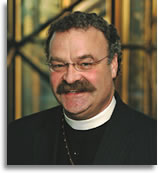 | |
Matthew Harrison
Rev. Matthew C. Harrison, 48, executive director of LCMS World Relief and Human Care since 2001, 1,332 nominations.
A 1989 graduate of Concordia Theological Seminary, Fort Wayne, Harrison, after graduate studies (S.T.M., 1991), served as a pastor from 1991 to 2001. He has served on a variety of boards and commissions, including the LCMS Board for Missions and the board of Lutheran World Relief. He is the founding president of the National Lutheran Housing Support Corporation.
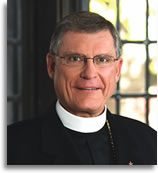 | |
Dr. Gerald B. Kieschnick, 67, president of the Synod since 2001, 755 nominations.
A 1970 graduate of Concordia Theological Seminary, Springfield, Ill., Kieschnick served as a pastor from 1970 to 1986. From 1986 to 1991, he was director of development (1986–88) and then executive director (1988–91) of the Lutheran Foundation of Texas. He was president of the Texas District from 1991 to 2001.
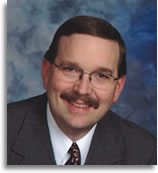 | |
Rev. Herbert C. Mueller Jr., 57, president of the LCMS Southern Illinois District since 1994, 503 nominations.
A 1979 graduate of Concordia Seminary, St. Louis, Mueller served as a pastor from 1979 to 1994. Also, he has served as secretary, second vice president, and first vice president of the Southern Illinois District and on several Synod committees or commissions, including the Commission on Ministerial Growth and Support.
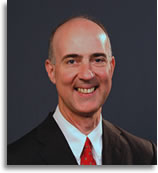 | |
Dr. Carl C. Fickenscher II, 55, associate professor at Concordia Theological Seminary, Fort Wayne, since 1999, 5 nominations.
A 1984 graduate of Concordia Theological Seminary, Fort Wayne, Fickenscher served as a pastor from 1984 to 1999. Since 2003, he has been the editor of Concordia Pulpit Resources. He has served in numerous circuit and district capacities, including circuit counselor and LWML zone and district counselor.
Daniel Gard
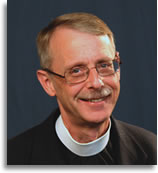
Dr. Daniel L. Gard, 56, professor at Concordia Theological Seminary, Fort Wayne, since 1989, 3 nominations.
A 1984 graduate of Concordia Theological Seminary, Fort Wayne, Gard served as a pastor from 1984 to 1989. Since 1998, he has served as a chaplain in the U.S. Navy Reserve. From 1998 to 2004, he was a member of the Commission on Ministerial Growth and Support; from 2000 to 2007, of the Committee Responsible for International Scholarship Programs.
Nominee Q & A
The nominees have responded to four questions asked by the staff of the LCMS Board for Communication Services. With the cooperation of the nominees, the answers have been edited to fit the space available. The questions and their answers will appear also in the June issue of Reporter.
Q: How would you judge the health of the Lutheran Church—Missouri Synod today?
Harrison: This is the most dynamic moment in history to be part of the LCMS! Worldwide opportunities abound. I’m giddy with hope (Rom. 15:4–13)! Yet, we are accomplishing a fraction of what’s possible. The New Testament shows us the twofold reality: “Saints” are also sinners, beset with problems (1 Cor. 1:2, 10ff.). It’s never been different. We need Jesus. We are blessed to know the Gospel in all its fullness. We have faithful workers, the two greatest Lutheran seminaries in the world, LLL, LWML, LCEF, great schools, partner churches—the list goes on! Best of all, the world is open for the mission of Christ. Healthy? Under the Law, no (Rom. 3:9ff.). But by the Gospel, we are congregations of living saints, blessed for this moment (Zech. 8:13; 1 Peter 2:9–10). The key to exploding upon the world in mission and mercy is this: Courage through repentance and renewal by the mighty Word of God. We’re no more or less healthy than that ragtag dozen who burst onto the world after Pentecost.
Kieschnick: A church’s health is measured by its faithfulness to Scripture and the Gospel which gives it birth and to which it is called to witness. The doctrine of forgiveness, life, and salvation in Christ alone is the foundation on which the church stands and the glue that holds it together.
By this standard, the LCMS is a healthy church. Every congregation and church worker is committed to the written Word of God, the Holy Scriptures, as confessed in the Lutheran Confessions.
When viewed, however, by God’s Law, the LCMS falls far short and is sick unto death. Too often the Gospel we are commanded to proclaim is undercut by the witness we give—indifference to sharing it with others, lack of civility and accountability in treating those with whom we disagree, distrust for one another, and failure to confess the full counsel of God in faithfulness to His Word.
Thanks be to God for His amazing grace in allowing us poor sinners, in spite of our sin, to serve Him through our beloved Synod, seeking to proclaim Christ’s Gospel in faithfulness and for the salvation of many!
Mueller: God gives such blessings—our biblical confession of Christ, congregations of baptized people who love serving the Lord, Christian schools unsurpassed in excellence, great seminaries and universities, well-formed ordained and commissioned ministers, a strong publishing house, synodwide agencies of mission, mercy, service, etc.
Unresolved issues, however, plague our life together: questions of worship forms, Communion practice, fellowship, church and ministry issues. For years we have sought to solve these problems by political means (voting), but this has only solidified political polarization. We have nothing to offer God save weakness, sin, and death. Spiritual health and life come when God, in mercy, works repentance, forgives sinful attitudes in the blood of Jesus, and gives faith, all through His Word. We need to deal with one another in terms of Christ and Him crucified and do the hard theological work to help each other hear the Word clearly so that our thinking, speaking, and practice are more unified under the Word of God.
Fickenscher: Let’s answer that on two levels. The first, the local congregation, is the more important, since it’s the only one specified in God’s design (as in 1 Cor. 1:2). Many of our congregations are struggling to remain vital. That’s a fact. However, these and all our congregations are the primary settings in which Christ is proclaimed and life given in His Sacraments. Where that is happening faithfully, the Holy Spirit is accomplishing everything He intends, and there, therefore, we are healthy!—even if we see shrinkage or aging or budget deficits.
The secondary level, the national Synod, exists to do those things individual congregations cannot. At this level, the healthy agencies are generally those that have been able to fund their own activities. Our two seminaries continue to prepare loving, faithful Lutheran pastors, our human-care arm sends relief all over the world, our publishing house resources the church, each by generating its own revenue exclusively, or largely so. Unfortunately, another precious service is less healthy; World Mission now fields many fewer career missionaries than a decade ago. Ironically, the greatest concern for our Synod’s “national health” is an area that requires no price tag: unity of doctrine. By God’s grace, our Synod is far more closely agreed on the teachings of Scripture than most American denominations. Our unity, though, is not what it once was, and that is not a healthy trend.
Gard: The Synod has great strengths in the many healthy parishes, where Word and Sacrament are found, and on its seminary campuses, where pastors are formed. Nevertheless, we face serious challenges and divisions in doctrine and practice. The president must lead calls (1) to repentance for our individual and corporate sin; (2) to prayerful, open, and serious theological reflection and dialogue through study of Scripture and the Confessions facilitated by our theological faculties; and (3) to a renewed focus on Word and Sacrament ministry. We will then rediscover the riches of Lutheran theology rather than relying on programs and non-Lutheran sources. Traditional Lutheran congregations, especially small ones, must be encouraged, not marginalized by an institutionalized emphasis on statistics. More than ever, the Church on earth needs to pray, “Kyrie eleison!”
Q: In today’s ‘whatever works for you culture,’ how can the LCMS best reach out to people with the Good News of Jesus and testify to the truth of God’s Word?
Harrison: It’s simple—and all in Mark 1. A dozen times the Greek text says “and immediately” Jesus “came,” “healed,” etc. In my favorite verse, Jesus says “Let’s go! . . . I came to preach” (1:38). He’s confronted by a leper. “If You will it, I may be clean.” “Having compassion,” Jesus “touched him.” There it is: (1) Jesus acts! Act! Don’t have another meeting! Go! Visit congregation and community. (2) Preach the Good News! We need a revival of Gospel-centered preaching! (3) Have compassion on the hurting—inside the Church and out (James. 2:15ff.). Dare to reach folks where they are (Matt. 25:34ff.). We are blessed with a substantive, biblical message for this insane, post-modern world. “You’re hurting. How’s that ‘whatever works’ thing going for you? You know, Jesus loves you. Here’s how much . . .”
Kieschnick: Christians often avoid non-Christians. Engaging people, not avoiding them, provides avenues for them to meet Christ. People in every culture seek answers to basic life questions: “Who am I? Where did I come from? Where am I going? Is there a God? Who is He? Does He have a plan for my life? Is there life after death? Is that life for me?” Genuine, caring relationships enable people to feel free to ask such questions in an atmosphere of trust and safety, providing Spirit-led opportunities for sharing God’s answers to those questions from His Word with Christ-centered love, care, and concern.
As God’s representatives, we are privileged and challenged to make known the eternal truths from Holy Scripture, which reveal His grace, mercy, and forgiveness to people who have not yet met Him. We must do so unapologetically, sensitively, boldly, caringly, and courageously.
Mueller: God gathers people in congregations to hear the Word and receive life in the Sacraments. “My sheep hear My voice,” Jesus said (John 10:27). Every congregation has Christ in its midst. Synod will best reach lost people with the Good News by working through districts to strengthen congregations. How is this done? Help congregations focus on Christ, proclaim justification by faith alone, live from the Word and Sacraments, comfort sinners, serve the neighbor, and plant new congregations. In His Great Commission, Christ unites doctrine and mission: Congregations with right teaching will reach out. Churches focused inward forget their purpose. Pushing doctrine to the side to “reach out” runs the risk of losing the Gospel. Healthy Lutheran congregations serve members and bring the Word to lost people. Every congregation lives in a particular place, so we help them reach out in ways lost people in that context will truly hear the Gospel.
Fickenscher: Great question, because our mission field here at home—to say nothing of overseas—is more diverse than ever. The answer, I believe, is to motivate our diverse individuals—2.4 million of them—to witness to Christ Jesus in each of the (again, diverse) locations and vocations they occupy. I would distinguish between motivating and mobilizing this vast army. Mobilizing implies a programmatic approach. Motivating is done in each heart by the news shared Sunday after Sunday that Christ’s death and resurrection has given me eternal life— and that means also you and them. All of you and all of them. The heart moved by this saving Gospel moves voices and feet and hands to share the Savior in ways unique to wherever God has placed them.
Gard: Any human culture can be reached as the Church has always reached people—by proclaiming God’s gift of salvation in Jesus. This alone offers a radical alternative to the deathly nature of human cultures, but the Church is muted when she becomes merely a religious reflection of the surrounding culture. We display the only alternative to the culture of death by boldly living what we confess to be—part of the one holy, catholic, and apostolic Church! Thus, we best reach the world by forming pastors at the seminaries and then sending and supporting graduates of both seminaries as they bring the Means of Grace to the world. Through the Means of Grace alone God creates and sustains faith and thus builds His Church. Anything else is doomed to failure. A truly “missional” Church begins and ends with the Cross and Easter and is empowered only by Word and Sacrament. Kyrie eleison!
Q: During this year’s convention, delegates will consider proposals to restructure the way the Synod is organized. What is your opinion of the recommendations from the Blue Ribbon Task Force on Synod Structure and Governance?
Harrison: The change we really need is not structural. We lack repentance. (Just look at how we treat one another [Gal. 5:16ff].) And we do not believe that the Word of God can actually unite us (Eph. 3:20). It’s time to resolve enduring issues (itistime.org). Part of me might like the massive increase in power proposed for the Synod President. That’s why it’s not a good idea. The power of Synod is only the power of the Word (Walther). There is good cause to celebrate non-geographic districts. Proposals that enjoy overwhelming support should be passed. Narrow decisions will render us more fractured. I am heartsick about the planned elimination of World Relief and Human Care. Change the Lord brings always works for good (Rom. 5:3; 8:28ff.).
Kieschnick: For more than four years task force members have addressed challenges in our Synod—unnecessary bureaucracy, lack of coordination, ambiguous supervisory relationships, inequitable representation, inefficient organization, insufficient accountability, etc. They have sought and responded to feedback from convention delegates and other leaders. While having expressed a few concerns, I believe task force recommendations are critical.
Amended structure and governance will not resolve all our challenges, but will enhance rather than impede the proclamation of the Gospel, improve efficiency, and increase effectiveness. What was first created as an organizational system for a Synod made up of a small number of congregations (14) now struggles to serve more than 6,100 congregations. Task force recommendations are designed to keep our Synod centered in Christ, passionate about accomplishing God’s mission, and devoted to carrying the Gospel which God has given to us with vision and courage into the future.
Mueller: Some recommendations may be helpful (e.g., a four-year convention cycle with theological convocations). Others bring concerns. (Should program boards be replaced with two advisory commissions? We can do it, but is it wise?) Though I appreciate the hard work involved in this effort, I wonder what will actually change. Are our problems structural? Or are they more theological and personal? All of us need the daily change of heart God works through repentance and faith. We are called to examine our actions and attitudes toward one another so that we confess our sins, trust God’s promise, and speak forgiveness to one another. Our theological issues need to be addressed by a thorough process in which we come to clear agreement on (1) the points at issue, (2) what we confess together, (3) what we reject, and (4) what we will, therefore, do together, on the basis of Scripture and our Confessions.
Fickenscher: Since God has neither commanded synods nor given a blueprint for them, He can surely continue His gracious will through whatever structures our limited wisdom determines. I appreciate that the goal of restructuring has been to enable congregations better to carry out their missions. However, it seems that few of the proposals actually do this! Revising delegate eligibility, selection, and number for conventions, for example, will not change what a congregation does on a Sunday morning or Tuesday evening. Terms of synodical or circuit offices, regionalizing vice presidencies, two commissions rather than many boards, will not be noticed back home. Doing less nationally does not mean more will happen locally.
Restructure if we wish, but let’s also address the chief reason some congregations hesitate to participate in wider programs of the Synod. It’s the sense by some that we’re not really walking together theologically.
Gard: We need reconciliation in Christ more than restructuring. While the BRTFSSG has certainly been creative, restructuring merely gives the illusion of progress through cosmetic changes while obscuring the need for unity in doctrine and practice. Many pastors and congregations have concerns including: (1) far too much centralization of authority, especially in the office of the president, with a resultant loss of checks and balances; (2) the employment of secular models of organization rather than churchly models; and (3) a process that does not allow for a congregational referendum prior to implementation of any or all the recommendations. I share those concerns. Kyrie eleison!
Q: In our present economic environment, money and resources seem tight everywhere. As president, how would you lead the Synod (nationally and locally) in stewarding its resources and people?
Harrison: At LCMS World Relief and Human Care, we’ve been responsible for receiving and managing some $100 million in donor funds over the last decade, always in the black. (1) The Synod has for years borrowed designated funds for operations. This is largely because LCMS World Mission costs (including the Fan into Flame campaign, despite best intentions) have exceeded revenues by millions yearly. It’s time to change how we do business. Synod’s Board of Directors must cease spending in excess of revenues. (2) Since 2001, undesignated funding (from districts) has dropped from $28 million to $18 million. The major cause, I believe, is that we have virtually ceased funding what congregations care most about: (a) Sending pastors to plant churches overseas (Rom. 10:15). (b) Training pastors and church workers (Matt. 9:37ff.). $2 million a year to each seminary can bring 200 international students to our campuses each year! We can rock the world for Christ! (c) Mercy for the needy (2 Cor. 8–9). There is no shortage to what the Lord can provide. The sooner we get back to these basics, (and stop doing some other things), the sooner we will realize it (2 Cor. 9:8). Let’s go!
Kieschnick: Faithful management of God’s gifts necessitates raising the level of Christ-centered biblical stewardship among our people and achieving greater expenditure efficiencies.
Generous contributions for mission support (Fan into Flame) and response to disasters (Katrina and Haiti) demonstrate the willingness of God’s people to respond to spiritual and physical need. Compelling, clear communication about such need is critical, enabling concerned Christians motivated by Christ’s love to respond.
Fewer paid staff can recruit, coordinate, and support volunteers with time, talent, and treasure to offer. Their hearts beat for local, national, and international mission, ministry, and mercy.
With a grateful heart I thank God for women and men who take seriously their role in the body of Christ and support the work of congregation, district, and Synod. I’m overwhelmed by their generosity and dedication!
Mueller: Even in our hands, all resources are God’s. We must use them wisely, be honest with people about needs and how funds are spent, make our priorities teaching the Word (e.g., seminaries and universities), bringing the Gospel to others (e.g., planting congregations at home and abroad), and doing works of mercy. At the same time, we remember Synod is designed to enable people to walk together under the Word of God. We help each other live from the Word and Sacraments and serve together in love, not by coercion but in the power of the Word and by loving persuasion. Visiting and encouraging district presidents in their responsibility of evangelical visitation of pastors and congregations is a top priority, so that we are “ONE People—Forgiven,” “standing firm in one spirit, with one mind striving side by side for the faith of the Gospel” (Phil. 1:27).
Fickenscher: Faithful stewardship, like evangelism, is a response by each Christian to the blessings of God. It can, therefore, be motivated only by the Gospel. This, then, too, is a matter for the place where the Gospel is proclaimed—the pulpits, altars, and homes of individual congregations and members. Let us preach Christ!—so that individual Christians respond, yes, also with their offerings, and let us trust congregations to use sanctified judgment in how best to allocate those gifts. Faithful use locally is the first priority. The national Synod will then function as congregations choose to make possible, whether that means more or fewer collective activities. When Synod has the confidence of its members, this will be sufficient.
Gard: Synod’s financial crisis predates the economic recession. People are reluctant to give to synodical coffers in part because so much is spent on consultants, professional fund-raisers, and overhead. The time has come for the gifts of God’s people to support the core purposes of Synod—seminaries, church-work programs at our colleges, and missions. We must fund our seminaries to support tuition-free residential study—for too many years, we have talked about it without doing it. Currently, only around 2 percent of the seminaries’ budgets are directly funded by Synod. The time has come to commit to a 50-percent subsidy of each seminary’s budget by 2013, with increasing percentages after that.
Just as important, mission offerings must directly support ordained Word and Sacrament missionaries at home and abroad. We need to send the best-trained pastors, especially more ethnic and linguistic-minority pastors, to all places of service. An expanded partnership between the seminaries and World Mission will bring more international students to our campuses, our professors to other countries, and will establish confessional Lutheran seminaries around the world. In 2010, the Synod has an opportunity to rededicate itself to these purposes. When seminaries and missions are financial priorities, proper stewardship is exercised and giving will increase. It is time. Kyrie eleison!
—





